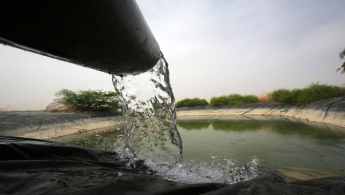Israel, Jordan agree US-brokered solar power for water deal
Jordan will provide solar power to Israel, which will in turn supply desalinated water to its desert neighbour, under a declaration of intent the two countries signed Monday.
Ministers from the neighbouring countries inked the US-brokered agreement at a Dubai Expo event joined by John Kerry, the US Special Presidential Envoy for Climate.
"The Middle East is on the frontline of the climate crisis," Kerry said in a statement. "Only by working together can countries in the region rise to the scale of the challenge."
The United Arab Emirates, which last year normalised relations with Israel, will reportedly build the solar power plant, the value of which was not disclosed.
Israeli Energy Minister Karine Elharrar said the Israel-Jordan agreement was the "most significant" since the former enemies signed a peace treaty in 1994.
"The benefit of this agreement is not only in the form of green electricity or desalinated water, but also the strengthening of relations with the neighbour that has the longest border with Israel."
Feasibility studies for the project are due to start next year.
Jordan is one of the world's most water-deficient nations and its cooperation on water with Israel dates back to before the two established formal relations.
Israel is also a hot, dry country, but its advanced desalination technology has opened opportunities for selling fresh water.
The declaration of intent says the Jordan photovoltaic plant with a capacity of 600 MW will export green power to Israel, which will supply Jordan with up to 200 million cubic metres of desalinated water.
Jordan, nearly landlocked, faces dire water prospects as its population expands and temperatures rise.
Experts say the future cooperation could help improve relations, which Jordan's King Abdullah has described as a "cold peace".
Under their 1994 peace treaty, the Jewish state recognises Jordan's oversight of Muslim holy sites in east Jerusalem, which has since 1967 been occupied by Israel and was later annexed.
But there are often demonstrations in Jordan in solidarity with the Palestinians.
The recent deals come after relations had cooled under Israel's former prime minister Benjamin Netanyahu.
Israeli Prime Minister Naftali Bennett, who took over in June, has made strengthening ties with Amman a priority.
Even when Israel and Jordan were enemies following the 1948 war that led to Israel's creation, they held water cooperation meetings that helped shape their peace deal.
They announced in July that Israel would sell 50 million cubic metres of water a year to Jordan, doubling what it already supplies, and in October agreed to raise the amount further.





 Follow the Middle East's top stories in English at The New Arab on Google News
Follow the Middle East's top stories in English at The New Arab on Google News


